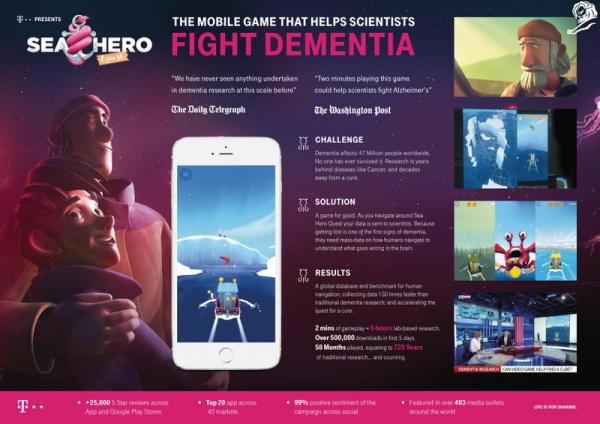7 November 2016
Dr. Jill M. Bjerke
There is no doubt the race to find the cure for Alzheimer’s and other dementia diseases is in full tilt and will be for some time. One only has to type “Alzheimer’s research” into a Google search to have a plethora of results returned. But there always seems to be an elusive “what if” in the back of the minds of those who are searching for answers.
When it comes to Alzheimer’s research I doubt anyone expected a video game to stand front and center in the anxious pursuit for solutions and this one is an app now available for Smart phones called Sea Hero Quest. The game has players set sail in search of precious objects (in the form of memories) which are collected at different places around the world and is the creation of Saatchi & Saatchi and Deutsche Telekom in partnership with a team of scientific researchers from University College London, The University of East Anglia and gaming experts, Glitchers.

Here is the intriguing part. As the player moves through the game, scientists can use the data you generate to gain insight into your spatial navigation abilities. The aim is collect data from all types of people, all ages, all geographic locations, etc. to quantify what the “normal” range of navigation skills is among unaffected people. This is what I would call a baseline and is akin to getting a blood test, mammogram or other analysis done while you are healthy to compare it to future tests that might spot issues. Once that “baseline” is established, neuroscientists can then develop guidelines to spot dementia early. (You can opt out of the data collection and still play the game.)
Current theory suggests that an early diagnosis can allow for access to the right services and support and can help people take more control of their lives, plan for their future and live well with this disease. Taking advantage of early identification can “buy time” which is an all-too precious a commodity. The affected person, family and friends can better prepare, discuss financial and legal arrangements and have the “luxury” of exploring every option available to them for medical, housing and other needs that will arise, especially from a caregiver’s point of view.
“There is strong evidence that an early diagnosis helps someone with dementia to continue to live independently in their own home for longer. This helps to avoid early or unnecessary admission to a care home or hospital, enhancing the quality of life for people with dementia and caregivers and providing substantial savings on long-term care costs. Drug and non-drug treatment can be more effective the earlier someone is diagnosed.” (Social Care Institute for Excellence)
Hugo Spiers, a neuroscientist at University College London (UCL), is leading the research stemming from the game’s data. “Fundamentally people with dementia — Alzheimer’s dementia — struggle to navigate and on a scientific level we don’t know enough of how people navigate to help really pin down what’s going wrong,” he said.
These investigators have approached early identification in a completely different manner. One of the hallmarks of the onset of dementia is the person’s subtle loss of the inability to establish where their body is in relation to other objects. This is technically called spatial navigation. Think of it this way. If you were blind, your brain would remember where certain objects are when you move around and your memory then would allow you to navigate safely around them. Dementia affects certain specific areas of the brain that involve this memory so the ability to navigate slowly becomes diminished.
Spatial memory is defined the ability to remember the position or location of objects and places. In general terms there are two ways to describe how the normal brain functions relative to spacial orientation. The first term is “egocentric” which basically describes how you know where to turn left and right on your way to work or the grocery store. Your brain retains this path.
The second is called “allocentric” navigation which completely relies on creating and memorizing a “mental map” of landmarks and using those landmarks in relation to other landmarks to move around. Deficits in both of these forms of direction-finding appear to be the hallmarks of the early stages of Alzheimer’s disease.
But the issue here is that one needs to data on the healthy, non-affected individual in order to compare it to one who has developed these symptoms and that is exactly what the UK researchers are doing. Hilary Evans, Chief Executive of Alzheimer’s Research UK has said, “It is a disease you can prevent…it’s not an inevitable part of ageing.”
If you want to be part of a groundbreaking effort to identify early onset Alzheimer’s, you only have to spend a few minutes of your time to contribute to a monumental solution. Help find out how people get lost – and found! Researchers were hoping for 100,000 users. As of this date, over 2 million players logged in.
References:
Etchells, Peter. 19 May 2016. “Sea Hero Quest: How A New Mobile Game Can Help Us Understand Dementia.” theguardian.com. The Guardian News and Media Ltd. 19 May 2016. Web. 24 July 2016.
https://www.theguardian.com/science/head-quarters/2016/may/19/sea-hero-quest-mobile-game-dementia-alzheimers-disease-spatial-navigation
Senthilingam, Meera. “This Video Game Could Help Doctors Diagnose Dementia.” CNN.com. Cable News Network. 4 May 2016. Web. 8 August 2016.
http://www.cnn.com/2016/05/04/health/dementia-game-sea-hero-quest/
Social Care Institute for Excellence, May 2015.
https://www.scie.org.uk/dementia/symptoms/diagnosis/early-diagnosis.asp
Image Credit: Gavan/Getty Images for Deutsche Telekom
Be sure to follow Dr. Bjerke’s blog at SilverSpacesBlog.com
Categories: Uncategorized

 How YOU can prevent devastating trips and falls in older adults
How YOU can prevent devastating trips and falls in older adults  Boomerang Adults and Alternative Dwelling Units
Boomerang Adults and Alternative Dwelling Units  Stuff, Stuff and More Stuff!
Stuff, Stuff and More Stuff!
Leave a comment